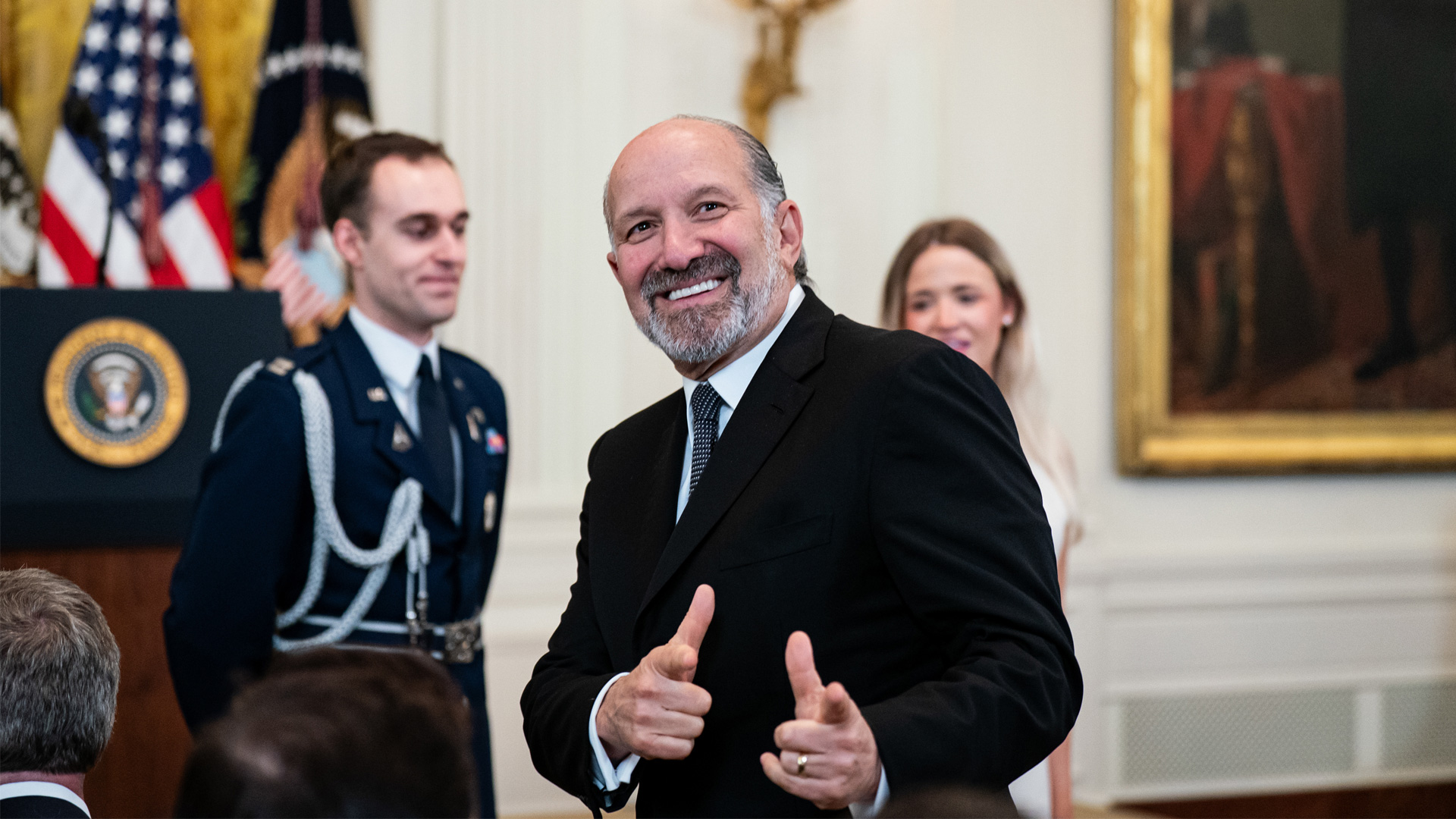US Commerce head notes China 'isn't even shy' about its goal to 'take' Taiwan, says US-Taiwan tariff deal coming soon — goal is to have 40% of chips made in America
Lutnick claims deal talks with Taiwan are advancing as the Trump administration turns up pressure on chipmakers to onshore advanced fabs.

Commerce Secretary Howard Lutnick said Saturday that a major semiconductor deal with Taiwan is coming “pretty soon,” signaling a potential breakthrough in U.S. efforts to shore up domestic chip production and reduce reliance on a single, geopolitically vulnerable supplier. The comment came during an interview with NewsNation, where he also set an ambitious target of increasing U.S. chip production to 40% of national needs before he leaves office.
Speaking about “... countries that need to react correctly to America,” in reference to U.S. trade policy, Lutnick said, “You still have Taiwan. That’s a big one that’s coming, I think, pretty soon. I expect to really be talking to them and sorting that out.”
Lutnick framed the stakes in blunt geopolitical terms. “The Chinese have said, ‘we’re going to take Taiwan,’” he told NewsNation. “They’re not even shy about it.” That threat, he says, is exactly why semiconductor manufacturing cannot remain concentrated on “an island 80 miles from mainland China” that makes “95% of our chips.”
These comments echo long-standing concerns about overdependence on Taiwan’s advanced foundries, particularly TSMC, which produces around 90% of the world’s leading-edge chips below 10nm. But the 95% claim could overstate Taiwan’s overall role. While the island is essential for high-performance CPU and GPU silicon, it accounts for around 44% of logic chips and 24% of memory chips that enter the U.S. market, according to a November 2023 working paper published by the U.S. International Trade Commission.
Still, the Trump administration is pushing hard to increase domestic manufacturing. The CHIPS and Science Act, passed under the Biden administration, is now being reinterpreted through a harsher lens. A proposed 1:1 chip rule would require companies to match every imported chip with one made domestically or face 100% tariffs, a major pivot from subsidies to leverage as U.S. officials seek lasting supply chain independence.
Lutnick’s comments concerning a Taiwan deal suggests the administration is now looking to formalize or expand its partnership with TSMC, which is already building two fabs in Arizona and, in March, pledged $100 billion toward U.S. investments over five years. That includes packaging and R&D infrastructure, but not yet a commitment to bring its most advanced 2nm-class platforms to the U.S.
If — and it’s a big if — an upcoming deal leads to TSMC bringing state-of-the-art node production to the U.S., it would mark a monumental shift in where leading-edge silicon is fabricated. TSMC is already producing N4 chips at its Arizona facility and plans to support N3 and then N2 by 2028-2029 at Fab 21, but locking in leading nodes will be tricky.
Get Tom's Hardware's best news and in-depth reviews, straight to your inbox.
Taiwan’s government has already signaled resistance to transferring its most advanced technology abroad, saying that it will ensure TSMC will “keep its most advanced manufacturing processes in Taiwan” under the proposed N-1 policy.
Follow Tom's Hardware on Google News, or add us as a preferred source, to get our up-to-date news, analysis, and reviews in your feeds. Make sure to click the Follow button!

Luke James is a freelance writer and journalist. Although his background is in legal, he has a personal interest in all things tech, especially hardware and microelectronics, and anything regulatory.
-
quorm China has always seen Taiwan as a part of China. And, this was something the US agreed with when Nixon visited China in 1972.Reply
https://en.m.wikipedia.org/wiki/Shanghai_Communiqu%C3%A9 -
Gururu And speaks to the insanity of making TMSC the premier fabricator of the world's best chips.Reply -
Mr Majestyk Reply
Almost as insane as hoping it's Intel. :fille:Gururu said:And speaks to the insanity of making TMSC the premier fabricator of the world's best chips. -
usertests Reply
They can be the premier while having the fabs off-shore. They have a fab in Japan, and are building one in Germany, for instance. Then there's Arizona. If all of Taiwan's fabs disappear in a puff of smoke, it won't entirely cripple the industry. Every year = additional pressure to distribute TSMC assets around and diversify the other parts of the supply chain.Gururu said:And speaks to the insanity of making TMSC the premier fabricator of the world's best chips.
The "insanity" could be seen as a part of a sane "silicon shield" strategy. But nobody made TSMC the premier, they outcompeted everyone else. GlobalFoundries dropped out of the leading edge node race, and Samsung has struggled to keep up. Intel is fumbling around and moving the goalposts, but will probably be forced by the government to make 14A a long-lived node at least.
If the industry regresses and the only new chips consumers are allowed to buy are newly produced Rocket Lake, Alder Lake-N, Picasso APUs, etc., then we'll enter an exciting new era where software optimization actually matters. -
Gururu Reply
Well honestly, America is being outcompeted in every industry by every foreign enterprise because of cheap labor, poor labor laws, and non-existent environmental regulations in foreign countries not to mention greedy American executives. Having fabs in other countries doesn't matter. If the company HQ, IP and funds are Taiwanese, they are pure risk.usertests said:They can be the premier while having the fabs off-shore. They have a fab in Japan, and are building one in Germany, for instance. Then there's Arizona. If all of Taiwan's fabs disappear in a puff of smoke, it won't entirely cripple the industry. Every year = additional pressure to distribute TSMC assets around and diversify the other parts of the supply chain.
The "insanity" could be seen as a part of a sane "silicon shield" strategy. But nobody made TSMC the premier, they outcompeted everyone else. GlobalFoundries dropped out of the leading edge node race, and Samsung has struggled to keep up. Intel is fumbling around and moving the goalposts, but will probably be forced by the government to make 14A a long-lived node at least.
If the industry regresses and the only new chips consumers are allowed to buy are newly produced Rocket Lake, Alder Lake-N, Picasso APUs, etc., then we'll enter an exciting new era where software optimization actually matters.
Sorry for being an American :PMr Majestyk said:Almost as insane as hoping it's Intel. :fille: -
Tanakoi Reply
You're misrepresenting that document. It says this:quorm said:China has always seen Taiwan as a part of China. And, this was something the US agreed with when Nixon visited China in 1972.
https://en.m.wikipedia.org/wiki/Shanghai_Communiqué
"The U.S. side declared: The United States acknowledges that all Chinese on either side of the Taiwan Strait maintain there is but one China and that Taiwan is a part of China"
In that document, the US also "reaffirmed its goal" of a peaceful, negotiated settlement of the China-Taiwan dispute.
